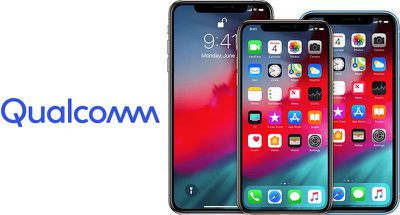Apple and Qualcomm are working to launch a new 5G iPhone as fast as possible, Qualcomm President Cristiano Amon said at Qualcomm's Snapdragon Tech Summit this week, reports PCMag.
The main goal of Qualcomm's renewed relationship with Apple is to get the iPhone launched on time, with rumors suggesting Apple's 5G iPhones are going to come in the fall of 2020. "Priority number one of this relationship with Apple is how to launch their phone as fast as we can. That's the priority," said Amon.

Given the need to get the phone out at the proper time, Amon said that while the first 5G iPhone will use Qualcomm modems, it might not include all of Qualcomm's RF front end. An RF front-end includes the circuitry between components like the antenna and receiver and it is important for boosting signal from various networks.
As PCMag points out, Qualcomm has called its newest Snapdragon modem chip a "modem-RF system," suggesting that eking out the best signal requires Qualcomm-created RF front-end components.
Apple instead will likely use its own technology and components alongside Qualcomm's modems in its 2020 iPhone lineup, which is something that the company has also done in prior years, but Apple will need to use Qualcomm millimeter wave antenna modules as it manufactures the only components that work with Verizon and AT&T's 5G networks at this time.
Right now, rumors suggest all of Apple's iPhones coming in 2020 will use 5G, though one rumor yesterday indicated that not all iPhones may support both mmWave and sub-6GHz 5G, the two kinds of 5G technology that are in the works.
Higher-end devices may be able to take advantage of mmWave and sub-6GHz 5G, while there's a possibility that Apple's more affordable devices will be limited to the sub-6GHz networks.
mmWave is the fastest 5G technology, but given its limited range, it's likely to be limited to major cities and urban areas. Sub-6GHz 5G is slower than mmWave 5G, but it will be able to be used in suburban and rural areas, and will still offer speeds faster than 4G LTE.
Apple and Qualcomm settled their long running legal dispute in April and inked a multi-year contract that will see Apple using Qualcomm modems in its devices going forward. Apple was forced to come to an agreement with Qualcomm after Intel was unable to meet Apple's modem needs.
Intel ultimately sold most of its smartphone modem business in July, and while Apple is working on its own modem chips, it will be reliant on Qualcomm in the near future. Given the late settlement between Apple and Qualcomm, the two have had to rush to get Qualcomm technology ready for 2020 iPhones.
"We re-engaged probably later than both of us would like, and I think we've been working together to try to get as much as possible done, and take as much possible advantage of what they've done before so that we can actually launch a phone on schedule with 5G," Amon said.
Amon went on to say that Qualcomm has a "multi-year agreement" with Apple. "We're setting no expectations on front end, especially because we engaged it very late," Amon explained. Overall, Amon said that he's "very happy" with the progress that's being made. "I expect that they're going to have a great device."























